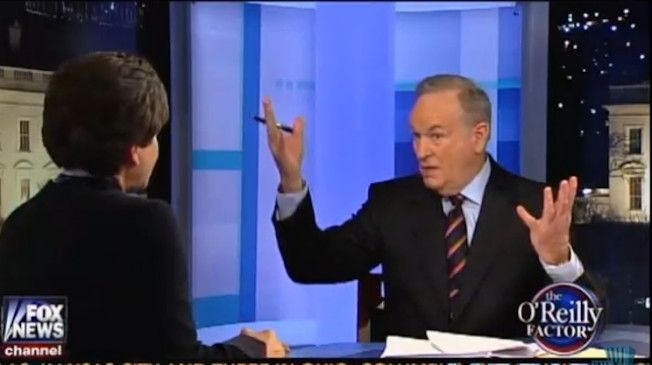Bill O'Reilly Has No Idea What Gangsta Rap Is

Bill O’Reilly has no idea what gangsta rap is.
The Fox News host had White House senior advisor Valerie Jarrett on his TV show “The O’Reilly Factor” on Thursday to discuss President Obama’s new “My Brother’s Keeper” initiative, which aims to support black young adults considered to be "at risk." O’Reilly said he felt the program was a "good start," but he hedged that by saying Obama needs to tackle broader cultural problems, beginning with the supposed “gangsta rappers” Kanye West and Jay-Z.
"You have to attack the fundamental disease if you want to cure it," O'Reilly told Jarrett. "Now, I submit to you that you're gonna have to get people like Jay Z, Kanye West, all these gangsta rappers, to knock it off.
"They idolize these guys with the hats on backwards, and the terrible rap lyrics and the drugs and all of that," he said, adding that other cultural figures -- including “athletes” and “tattoo guys” -- need to be better role models for at-risk youth than they are now.
Based on his statements, it seems unlikely that O’Reilly has ever actually listened to Kanye West or Jay-Z. In fact, he doesn’t seem to know much about hip-hop at all. Gangsta rap isn’t just a catch-all term for hip-hop, as O’Reilly seems to use it. In fact, that sub-genre of hip-hop reached the height of its popularity in the ‘90s when artists like Ice Cube, the Notorious B.I.G. and Tupac Shakur rapped about drive-bys, drug dealing, and the harshness of life on the streets with gritty, if exaggerated, realism.
Out of all hip-hop artists, Kanye West and Jay-Z couldn’t be further from that archetype. Kanye West’s latest album ranges from deeply personal confessions to social commentary, and it doesn’t touch at all on gangs or drug dealing. The only diss track “Yeezus” contains is directed at a fashion designer who refused to let Kanye into high-profile shows during a recent Paris Fashion Week. “Cop Killer” it isn’t.
The lyrics to Jay-Z’s latest CD, “Magna Carta Holy Grail,” read more like an inventory of Jay-Z’s high-end possessions than a criminal record. If anything, Kanye West and Jay-Z are positive influences for at-risk youth: Jay-Z is a highly successful entrepreneur, and Kanye West is increasingly viewed as an avant-garde artist. In O’Reilly’s mind, it appears, they must be gangsters just because they’re rappers..
Admittedly, when Jay-Z first burst onto the scene with “Reasonable Doubt,” he projected a much harder image than the one he projects now. “Brooklyn’s Finest,” his collaboration with Biggie Smalls, contains plenty of stereotypical gangster imagery ripped straight from the movie “Scarface.” Even when Jay-Z did rap about the thug lifestyle, though, he always seemed more enamored with what a criminal career could buy him than anything else. As Jay-Z went on to become a legitimate uber-successful mogul and "business, man," he dropped the outlaw image from his music and persona.
In fact, the popularity of gangster rap has steadily declined since the 2000s began. Drake has been topping the charts with a famously "soft" image as a former star of Canadian teen TV show "Degrassi: The Next Generation," whereas Rick Ross’ druglord persona was cribbed wholesale from an actual drug kingpin. Kendrick Lamar, who nearly won a Grammy for his major-label debut “Good Kid, m.A.A.d. City,” takes pains not to glorify inner-city problems in his hometown of Compton. It doesn’t matter to O’Reilly, though. To him, they’re all gangsters.
No word yet on whether or not O’Reilly is concerned about how criminals portrayed in “Breaking Bad” are harming white youth -- but check out his statements on Jay-Z, Kanye West and hip-hop in general below.
<script type="text/javascript" src="http://video.foxnews.com/v/embed.js?id=3267958019001&w=466&h=263"></script><noscript></noscript>
© Copyright IBTimes 2025. All rights reserved.





















